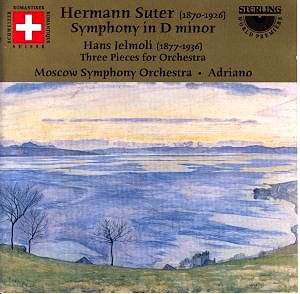The name Adriano is synonymous with the championing
of little known Late-Romantic music. Here the conductor introduces
works by two Swiss late 19th/early 20th centuries composers.
It has to be said immediately that they are hardly earth-shaking;
but the Jelmoli has a certain charm.
Hermann Suter was born in Kaiserstuhl near Aarau,
Switzerland. In Basel he studied piano and composition under Hans
Huber and theory and organ under Alfred Glaus. Later he studied
with Carl Reinecke in Leipzig. The music of Wagner and Richard
Strauss were considerable influences. Under the direction of Suter,
as principal conductor, the Basel orchestra was rapidly to become
an excellent ensemble with an incredible repertoire of works from
Bach to Schoenberg, including hitherto neglected composers such
as Anton Bruckner, César Franck, Edward Elgar, Frederick
Delius and Russian composers including Stravinsky.
Suter’s Symphony in D minor is scored for a large
orchestra and is an imposing structure. Much of the material is
based on Swiss folk music. Beginning menacingly, its first movement
encompasses many moods, sometimes tender and soothing, sometimes
fierce or grotesquely spectral. Often it sounds as though it is
a score for a swashbuckler - is that Errol Flynn riding over the
horizon? Alas too often it all sounds too pretentious like Richard
Strauss on a bad day. At times this bombast teeters perilously
on the edge of bathos, blame the over-emphatic, over-repetitive,
poorly shaded brass writing. More wince-making are the brass raspberries
that punctuate the second movement. This is ear-shatteringly loud
and vacuously bombastic. It is marked Capriccio militaresco,
alla marcia, the music, slightly reminiscent of Nielsen,
is supposed to lampoon the Swiss petty bourgeois mentality of
the time. The third movement, the Brahmsian Adagio molto, is the
most interesting part of the symphony, deeply felt, intense and
embracing simple folksong elements and material of a liturgical
nature. The finale alas returns to the pompous and ponderous redeemed,
to some extent, by nicer passages of pathos.
Hans Jelmoli was born in Zurich into the family
of rich department store proprietors. Like Suter, Jelmoli used
Swiss folk material in his compositions. His music for the lyrical
comedy His Legacy is on a much smaller scale. Recorded
here are three charming lightweight miniatures extracted by the
composer for concert performances but never published. The Prélude
is a four-part suite-overture with short introduction and coda
featuring the comedy’s main tunes A witty march-like Allegretto
grazioso leads into a lyrical string episode followed by a
waltz and an extended dance combining tambourine and gallop. The
second piece, with harp predominant, the Intermède lyrique,
is reminiscent of Tchaikovsky’s ballet music. The third piece,
Reigen, is charming folk material.
The Suter Symphony is bombastic melodrama, sometimes
teetering on the edge of banality. Adriano gives it a powerful
and enthusiastic reading but it is the sort of work to listen
to once and then file under the heading ‘curiosities’. The smaller-scale
Jelmoli music is charming.
Ian Lace
see also review
by Rob Barnett
